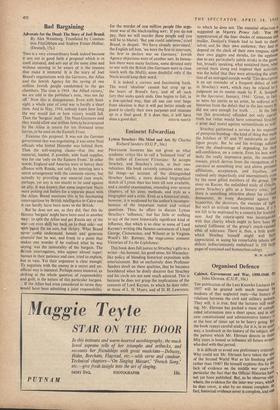Bad Bargaining
Advocate for the Dead: The Story of Joel Brand. By Alex Weissberg. Translated by Constan- tine FitzGibbon.and Andrew Foster-Melliar. (Deutsch, 15s.)
THIS is a very extraordinary book indeed because it sets out in good faith a proposal which is in itself immoral, and sets out at the same time and without seeming to be aware of it the reasons that make it immoral. It is the story of Joel Brand's negotiations with the Germans, the Allies and the Jewish Agency for the saving of one million Jewish people condemned to the gas chambers. The time is 1944. 'An Allied victory,' we are told in the publisher's note, 'was not far off.' Now this is disingenuous. Even with hind- sight, a whole year of total war is hardly a 'short time. And in May, 1944, nobody knew how long the war would last or how victory would fall. Then the 'bargain' itself. The Nazi-Germans said they would allow one million Jews to be-evacuated by the 'Allies in return for ten thousand army lorries, to be used on the Eastern Front.
Examine this proposal. It was not the German government that was negotiating, it was some Nazi officials who hinted Himmler was behind them. Then the soft-soaping clause—that this war material, loaded, if possible, with food supplies, was for use 'only on the. Eastern Front.' In other words, England and America were to betray their alliance with Russia, not only by entering into a secret arrangement with the common enemy, but actually by providing war material (not much; perhaps, yet any is too much) to be used against an ally. It was known_that some important Nazis were putting out feelers for a separate peace with the Allies. Brand mentions this in his fascinating interrogations by British intelligelice in Cairo and it can hardly have been news to the British.'
But he does not see, as they did, that this in- famous `bargain' might have been used in another way: to split the Allies and get Russia out of the war—or even shift her back, on to their side—not with 'peace fbr an aim, :butt victory. What Brand never coeld understand, honest and generous creature that he was, and frank to a point that makes one wonder if he realised what he was saying, was the immorality of the bargain. The British interrogators, who appear almost super- human in their patience and care, tried to explain, but in vain. Yet their argument is clear enough:' To negotiate with the enemy in a secret and un- official way is immoral. Perhaps more immoral, as striking at the whole question of responsibility and guilt, is the nature of this particular bargain.
If the Allies had even considered its terms they would have been admitting a joint responsibility for the murder of one million people (the argu- ment was of the blackmailing sort : If you do not pay, then we will murder these people and you will be to blame). 'But you could intervene,' cried Brand, in despair. 'We have already intervened,' the English tell him, 'we were the first to intervene, the first to declare war on Germany.' Jewish Agency objections were of another sort. In Jerusa- lem there were many factions, some devoted only to war with the British (the Germans were in close touch with the Mufti), some doubtful only if the Nazis would keep their word.'
It is indeed a curious and fascinating book. The word 'idealism' cannot but crop up as the heart of Brand's fury, and of all such fury that seeks quick ends. One begins to feel, in a low-spirited way, that all one can ever hope from idealism is that it will put better minds on guard to clarify their own purposes and measure up to a final good. If it does that, it will have




























 Previous page
Previous page